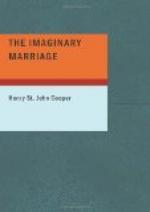“Very!”
“I have to thank you for helping my—” Johnny paused; he had almost said sister, but of course Ellice was not his sister—“my little friend yesterday, about the bike I mean.”
“That’s nothing! Excuse interference on my part, but if you pour that petrol into the radiator, you will probably develop trouble.”
Johnny Everard laughed. “I am new to it, and I am always doing odd things like that. Of course, that’s for water. Lawson over at Little Langbourne generally sees to things for me.”
Hugh nodded. He looked at the man standing but a few feet from him, the man who was to gain that which Hugh coveted and desired most in the world, looked at him and yet felt no dislike, no great enmity, no furious hate.
“It was very good of you to help the kiddie with her bike,” said Johnny, as he splashed the petrol into the tank. “If you find yourself at any time over at Little Langbourne, we’d be glad to see you. My name’s Everard, my place is Buddesby.”
“Thanks! It is very good of you, and I shan’t forget!” He nodded, smiled, and walked on, then glanced back. He could see Johnny fumbling with the car, and he smiled.
“That’s my hated rival, and he seems a decent sort of chap.”
An hour later he was back at Mrs. Bonner’s cottage.
“The post’s come in since you went, Mr. Alston,” said Mrs. Bonner, “and there’s a letter for you.”
It was a bulky envelope from Hurst Dormer. There was a note from Mrs. Morrisey, to say that everything was going as it should go, and she enclosed all the letters that had come by post.
And the first letter that Hugh opened was one on pink paper, delicately scented. How well he remembered that scent! How it brought back to him a certain pretty little face, and a pair of sweet blue eyes.
“Dear little maid,” he said. He read the letter, and stared at it in astonishment and dismay.
CHAPTER XXXII
THE SPY
It seemed to Hugh Alston that he had not read the letter aright; it was so amazing, so disconcerting, that he felt bewildered. What on earth is wrong? he thought, then he took the letter to the better light at the window and read again.
“My dear Hugh,
“I have been over to Hurst Dormer three times in the car, each time hoping and praying that I might find you; but you are never there now, so I am writing, Hugh, hoping that you will get my letter. I know I have no right to.” (This, Hugh noticed, had been carefully crossed out.) “I want to see you so much. I want to ask your advice and help. I don’t know what to do, and I am so unhappy, so wretched. Forgive me, dear, for troubling you, but if—if only I could see you I am sure you would help me, and tell me what it is right I should do. Ever and ever
“Your loving,
“Marjorie.”




